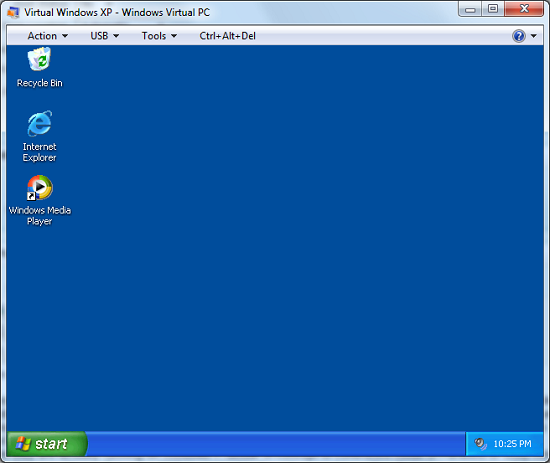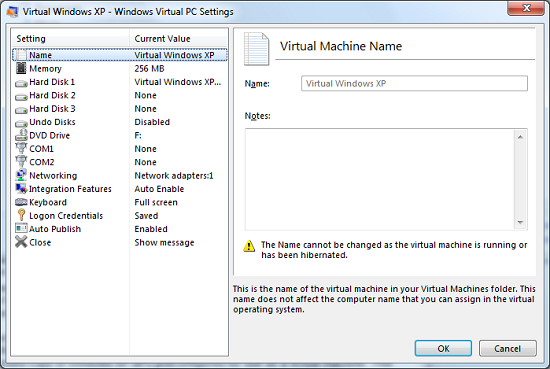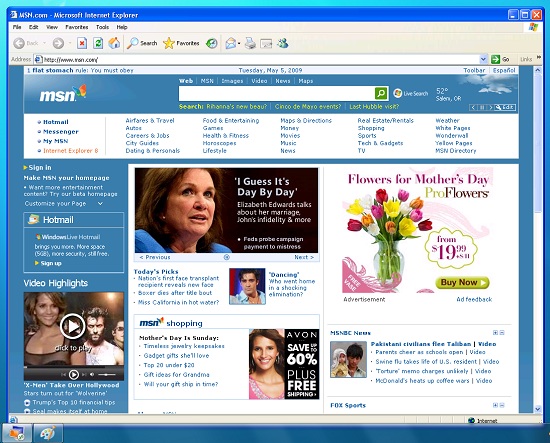Windows 7: Release Candidate 1 Preview
by Ryan Smith and Gary Key on May 5, 2009 11:00 PM EST- Posted in
- Systems
Virtual Windows XP
As we mentioned previously, Microsoft’s big secret unveiled with Windows 7 RC1 is Virtual Windows XP (VXP for short). One of the issues Microsoft has been having in bringing business users over from Win2K and XP to Vista and beyond has been that Windows does not have perfect backwards compatibility. With consumer applications this is not such a big deal since most of those are wide-audience products that get updated regularly, but this is not always the case for business software. Whether it’s some custom in-house application that no one can fix, or a 3rd party application that just works and can’t be updated, business users sometimes can’t escape the fact that they need to be able to run old applications that don’t work in newer operating systems.
VXP is in essence the bone Microsoft is throwing to business users to allow them to run those old applications while using Windows 7. VXP leverages Microsoft’s existing Virtual PC virtualization software that they acquired several years back, by bundling it with a fully licensed copy of Windows XP SP3 preconfigured for use as a virtual machine. This virtual machine can then be partially integrated in Windows 7 so that applications operating inside of it look and behave like they are actually running on Windows XP, similar in concept to the coherence mode of Parallels or Unity mode of VMware. In this case Microsoft is using RDP to connect to the virtual machine rather than screen scraping the entire desktop like Parallels and VMware do. Microsoft does the same thing for the Windows Home Server Console.

VXP Desktop View
As Virtual PC was already free, the significance of this announcement is not the technical details, but rather that Microsoft is endorsing it as an official solution to backwards compatibility problems. It’s long been expected that Microsoft would do something with Virtual PC as a backwards compatibility solution and this is finally it, albeit in a limited role.
Because of the system requirements and issues raised by relying on a virtual machine of XP, VXP is a last-ditch compatibility solution rather than any kind of primary solution. On the system requirement side, VXP requires a processor with hardware virtualization features, along with at least 256MB of RAM and the disk space needed to run the virtual machine. It’s not too bad for a modern system, but it does rule out an older system that may be suitable for upgrading to Windows 7, but not running VXP on top of that.

VXP Configuration
As for the issues raised by using VXP, first and foremost it’s a complete copy of WinXP, with all of its security deficiencies and bugs. It needs security software, it needs administration, and it needs security updates. This also brings up a matter that Microsoft hasn’t answered yet: what happens when WinXP support ends in 2014? Windows 7 will have support until at least 2020, which means either Microsoft is going to drop support for this component of Windows 7 early (an unprecedented move) or they have to extend XP support to match Windows 7’s support cycle. We’re still trying to get a final answer on this.
It should also be noted that VXP only comes with Professional edition and higher, as it’s not intended to be a consumer compatibility solution. And before anyone gets any ideas, it’s not suitable for playing games – the graphics hardware is the usual emulated S3 Trio 64, and the screen does not refresh nearly fast enough to keep up with any kind of action game. Solitaire may be playable, however.

VXP in integrated mode running IE6
At any rate, Virtual Windows XP is a good solution to some compatibility needs, so long as it’s recognized that it’s not the solution to all compatibility needs. For the handful of business users it’s designed for, we would expect that it does its intended job well. However for non-business users that absolutely must have a virtual machine (and won’t need support from Microsoft), it may be worthwhile to look into a free solution like VirtualBox.
Looking towards the future, there has been a lot of speculation that Microsoft may try to make a big break from the Windows APIs in order to clear out all the cruft and deprecated functions that litter their APIs. This isn’t happening today with Windows 7 and VXP, but integrating a virtual machine is the first stepping stone in making it happen. What Microsoft does after VXP is undoubtedly going to be a matter of great interest.










121 Comments
View All Comments
Lexington02 - Wednesday, May 6, 2009 - link
He is not late, he is claiming otherwise to the other people who think that Anandtech is MS loving while this dude is claiming to be Apple loving. I wonder, which is true... Apple lovers or Microsoft lovers...Lexington02 - Wednesday, May 6, 2009 - link
He is not late, he is claiming otherwise to the other people who think that Anandtech is MS loving while this dude is claiming to be Apple loving. I wonder, which is true... Apple lovers or Microsoft lovers...Ryan Smith - Thursday, May 7, 2009 - link
From my perspective, if I'm being accused of being an Apple and a Microsoft fanboy in the same article, then I must be doing something right.;-)I'll note that I have a preference for Mac OS X if given a choice, but I'm getting ahead of myself. I'll talk more about that in next week's Ubuntu article.
strikeback03 - Thursday, May 7, 2009 - link
That was my point - I have long stated that 90% of the articles here that compare something generate comments from both sides claiming bias each way. So the anti-Apple comments were late arriving compared to the anti-MS ones.Are we really going to get a Ubuntu article? Is it now on the transition to 9.04 instead of 8.04?
Ryan Smith - Thursday, May 7, 2009 - link
8.04 (because it's the LTS and most comparable to Windows/Mac OS X as such), to be followed up with 9.04.strikeback03 - Thursday, May 7, 2009 - link
Cool. 9.04 finally resolved some out-of-the-box compatibility problems my desktop has had with each release since I started (6.10)Gary Key - Thursday, May 7, 2009 - link
I am still a big fan of DR-DOS. Does that mean I am anti-MS also? :)MichaelD - Wednesday, May 6, 2009 - link
This is important for me as that's what I use for an AV/AM solution. Overall, it looks very impressive, particularly for a RC; it may just get me away from XP.masterbm - Wednesday, May 6, 2009 - link
I have been using windows 7 on my old amd socket 939 4200 4gb ram 8800gs. I started since build 7000. I started out being guy how felt that I was going to stay on vista for most of my machine I will upgrade to windows when it released. My htpc/file server at this time I plan on leaving it at vista. Due to their is no really good way to convert the .wtv format. This htpc box is automated in since it defrag it self scan it self for virus and spyware. Then It just added auto convert of the show that records. I took while to do that stuff not sure if want do every again.(also note htpc is amd 3800)The other thing I will note is that windows 7 becuase it feels snappier has made use that system more then use tofausto412 - Wednesday, May 6, 2009 - link
They need to make the defrag problem able to do more than one drive at a time...or to schedule them out.